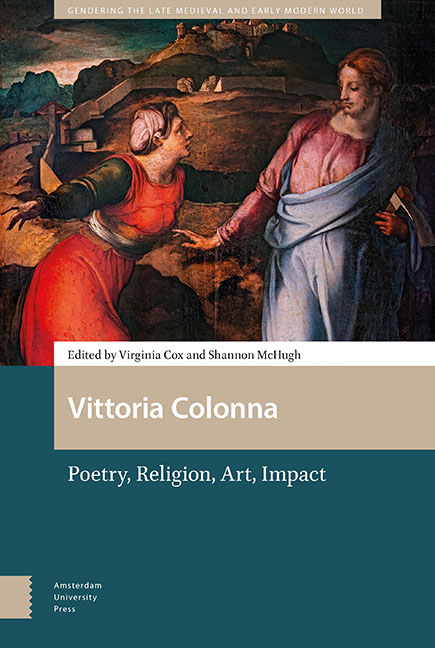Book contents
- Frontmatter
- Dedication
- Contents
- List of Illustrations
- Acknowledgements
- Introduction: The Twenty-First Century Vittoria Colonna
- Part 1 Literary and Spiritual Sociability
- Part 2 Widowhood
- Part 3 Poetry
- Part 4 Art
- Part 5 Readership
- Part 6 Impact
- Volume Bibliography
- Index of Citations of Colonna’s Letters and Verse
- Thematic Index
5 - The Epistolary Vittoria
Published online by Cambridge University Press: 16 December 2021
- Frontmatter
- Dedication
- Contents
- List of Illustrations
- Acknowledgements
- Introduction: The Twenty-First Century Vittoria Colonna
- Part 1 Literary and Spiritual Sociability
- Part 2 Widowhood
- Part 3 Poetry
- Part 4 Art
- Part 5 Readership
- Part 6 Impact
- Volume Bibliography
- Index of Citations of Colonna’s Letters and Verse
- Thematic Index
Summary
Abstract
To fully understand the importance of epistolary exchange and epistolarity in Vittoria Colonna's thought and writings, it is necessary to go beyond the conventional categories handed down to us by the critical tradition. Within the limits of what may be achieved in the absence of a complete critical edition, we need both to examine the complex networks of relationships within which Colonna moved in her lifetime, and also to investigate the profound connections between her poetic compositions, her epistolary writing and her religious reflections, all pervaded by a similar dialogic impulse.
Keywords: Letters, letter collections, friendship, networks, epistolary exchange
Among the various ‘firsts’ that Vittoria Colonna achieved over the course of her life—in addition to that initial, fundamental one of being the first woman to see published an entire volume of Rime under her name—I would like to underline at least another four. These are well known, and they have been helpfully highlighted and analyzed by Adriana Chemello in the recent Brill Companion to Vittoria Colonna. It is around these four ‘firsts’ that I will structure this chapter.
The first of the four is constituted by Colonna's early terza rima ‘Pistola’ (Epistle), on the model of the Heroides (and also, naturally, Boccaccio's Fiammetta). Written in 1512 (and printed in 1536), and addressed to Colonna's distant husband, this poetic letter establishes a new and interesting model for women's writing: one that lays claim to a powerful authorial subjectivity and that critically examines the poet's ‘abandonment’, expressing very clearly an alternative perspective on love and war. It seems that Colonna's husband, Ferrante Francesco d’Avalos, wrote a poetic response to the ‘Pistola’, but we have only the faintest trace of this.
The second ‘first’ of Colonna's I would like to recall here is that of having been a part, from the very beginning, of that new phenomenon that began to assert itself from the 1540s, and which would have such an impact on the literary society of the age: the phenomenon of the ‘book of letters’. Already in the volumes of Lettere volgari di diversi nobilissimi uomini, published from 1542 by Paolo Manuzio, the Marchioness of Pescara figures as the most consistent and the richest presence among the rare women whose letters find their way into these anthologies, offered as models for a practice of epistolary writing that is in the process of organizing itself as an autonomous genre.
- Type
- Chapter
- Information
- Vittoria ColonnaPoetry, Religion, Art, Impact, pp. 117 - 134Publisher: Amsterdam University PressPrint publication year: 2021



